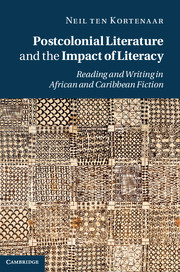 Postcolonial Literature and the Impact of Literacy
Postcolonial Literature and the Impact of Literacy Book contents
- Frontmatter
- Contents
- Acknowledgements
- 1 Introduction
- 2 The coming of literacy: Arrow of God by Chinua Achebe
- 3 The contents of the tin trunk: Ìsarà by Wole Soyinka
- 4 Mr Biswas finds a home in the world on paper: V. S. Naipaul
- 5 Literacy in the world not ruled by paper: Myal by Erna Brodber
- 6 Southern Africa's Houses of Hunger
- 7 Conclusion: the frontiers of writing
- Notes
- Bibliography
- Index
2 - The coming of literacy: Arrow of God by Chinua Achebe
Published online by Cambridge University Press: 01 June 2011
- Frontmatter
- Contents
- Acknowledgements
- 1 Introduction
- 2 The coming of literacy: Arrow of God by Chinua Achebe
- 3 The contents of the tin trunk: Ìsarà by Wole Soyinka
- 4 Mr Biswas finds a home in the world on paper: V. S. Naipaul
- 5 Literacy in the world not ruled by paper: Myal by Erna Brodber
- 6 Southern Africa's Houses of Hunger
- 7 Conclusion: the frontiers of writing
- Notes
- Bibliography
- Index
Summary
Achebe's Arrow of God is an extended meditation on what it means to write in Africa. The hearth scene in which Oduche reads while his mother tells a story radiates outward so that we find images of literacy everywhere in the novel, even where it does not appear on the level of the story. In particular, the experience of reading and writing informs three different narrative spaces integral to the novel: the container so confining as to be suffocating, the straight line that cleaves through the natural world, and the small room with a single occupant receptive to a disembodied voice but disturbed by the voices of people outside.
LITERACY, THE HEARTH, AND THE WORLD
The domestic hearth in Ugoye's hut is a space apart from the masculine adult world of political and religious conflict that is the main focus of the novel. It can be usefully compared to the hearth scenes in European and American literature discussed by Sarah Robbins and Friedrich Kittler, in which parents read to or are read to by children. The western ideal, dating from the Middle Ages, is ‘of the mother teaching her little boy to read’. As Garrett Stewart notes, ‘a written text inspiring an oral intimacy is … the Dickensian family scene par excellence’. And, according to Robbins, the conjunction of adult, children, fireside, and chores was emblematic of domestic-based literacy in nineteenth-century America.
- Type
- Chapter
- Information
- Postcolonial Literature and the Impact of LiteracyReading and Writing in African and Caribbean Fiction, pp. 22 - 62Publisher: Cambridge University PressPrint publication year: 2011


